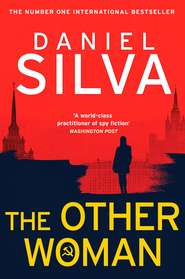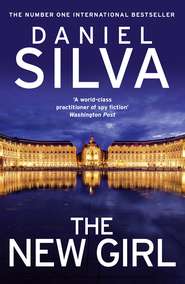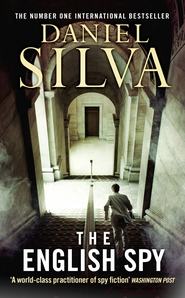По всем вопросам обращайтесь на: info@litportal.ru
(©) 2003-2024.
✖
The Heist
Настройки чтения
Размер шрифта
Высота строк
Поля
Gabriel told him.
“So much for your sabbatical in Venice,” said Isherwood. “It seems I’ve ruined everything.”
“It’s the least I can do for you, Julian. I owe you a great deal.”
Isherwood smiled wistfully. “How long has it been?” he asked.
“A hundred years.”
“And now you’re going to be a father again, twice over. I never thought I’d live to see the day.”
“Neither did I.”
Isherwood looked at Gabriel. “You don’t sound thrilled about the prospect of having children.”
“Don’t be ridiculous.”
“But?”
“I’m old, Julian.” Gabriel paused, then added, “Perhaps too old to be starting another family.”
“Life dealt you a lousy hand, my boy. You’re entitled to a bit of happiness in your dotage. I must admit I envy you. You’re married to a beautiful young woman who’s going to bear you two beautiful children. I wish I were in your shoes.”
“Be careful what you wish for.”
Isherwood drank slowly of his Bellini but said nothing.
“It’s not too late, you know.”
“To have children?” he asked incredulously.
“To find someone to spend the rest of your life with.”
“I’m afraid I’m past my expiration date,” Isherwood answered. “At this point, I’m married to my gallery.”
“Sell the gallery,” said Gabriel. “Retire to a villa in the south of France.”
“I’d go mad in a week.”
They left the bar and walked a few paces to the Grand Canal. A sleek wooden water taxi gleamed at the edge of the crowded dock. Isherwood seemed reluctant to board it.
“If I were you,” said Gabriel, “I’d get out of town before the general changes his mind.”
“Sound advice,” replied Isherwood. “May I give you some?”
Gabriel was silent.
“Tell the general to find someone else.”
“I’m afraid it’s too late for that.”
“Then watch your step out there. And don’t go playing the hero again. You have a lot to live for.”
“You’re going to miss your plane, Julian.”
Isherwood teetered aboard the water taxi. As it eased away from the dock, he turned to Gabriel and shouted, “What do I say to Oliver?”
“You’ll think of something.”
“Yes,” said Isherwood. “I always do.”
Then he ducked into the cabin and was gone.
5 (#ulink_dbe8a6fc-024e-56ce-bf48-e39da740f526)
VENICE (#ulink_dbe8a6fc-024e-56ce-bf48-e39da740f526)
GABRIEL WORKED ON THE VERONESE until the windows of the nave darkened with dusk. Then he rang Francesco Tiepolo on his telefonino and broke the news that he had to run a very private errand for General Cesare Ferrari of the Carabinieri. He didn’t go into any of the details.
“How long will you be gone?” asked Tiepolo.
“A day or two,” replied Gabriel. “Maybe a month.”
“What shall I say to the others?”
“Tell them I died. It will lift Antonio’s spirits.”
Gabriel straightened his work platform with more care than usual and went into the cold evening. He followed his usual route northward, across San Polo and Cannaregio, until he came to an iron bridge, the only iron bridge in all of Venice. In the Middle Ages there had been a gate in the center of the bridge, and at night a Christian watchman had stood guard so that those imprisoned on the other side could not escape. Now the bridge was empty except for a single gull that glared at Gabriel malevolently as he trod slowly past.
He entered a darkened sottoportego. At the end of the passageway a broad square opened before him, the Campo di Ghetto Nuovo, the heart of the ancient ghetto of Venice. He crossed the square and stopped at the door of Number 2899. A small brass plaque read COMUNITÀ EBRAICA DI VENEZIA: JEWISH COMMUNITY OF VENICE. He pressed the bell, then, instinctively, turned his face away from the security camera.
“Can I help you?” a familiar female voice asked in Italian.
“It’s me.”
“Who’s me?”
“Open the door, Chiara.”
A buzzer howled, a deadbolt snapped open. Gabriel entered a cramped passage and followed it to another door, which unlocked automatically as he approached. It gave onto a small office, where Chiara sat primly behind an orderly desk. She wore a sweater of winter white, fawn-colored leggings, and a pair of leather boots. Her riotous auburn hair fell across her shoulders and upon a silk scarf that Gabriel had purchased on the island of Corsica. He resisted the impulse to kiss her wide mouth. He didn’t think it proper to express physical affection toward the receptionist of the chief rabbi of Venice, even if the receptionist also happened to be the rabbi’s devoted daughter.
Chiara was about to address him but was interrupted by the ringing of the telephone. Gabriel sat on the edge of her desk and listened as she dispensed with a small crisis afflicting a shrinking community of believers. She looked astonishingly like the beautiful young woman he had first encountered, ten years earlier, when he had come calling on Rabbi Jacob Zolli for information on the fate of Italy’s Jews during the Second World War. Gabriel had not known then that Chiara was an agent of Israeli intelligence, or that she had been assigned by King Saul Boulevard to watch over him during the restoration of the San Zaccaria altarpiece. She revealed herself to him a short time later in Rome, after an incident involving gunplay and the Italian police. Trapped alone with Chiara in a safe flat, Gabriel had wanted desperately to touch her. He had waited until the case was resolved and they had returned to Venice. There, in a canal house in Cannaregio, they made love for the first time, in a bed prepared with fresh linen. It was like making love to a figure painted by the hand of Veronese.
On the day of their first meeting, Chiara had offered him coffee. She no longer drank coffee, only water and fruit juice, which she sipped constantly from a plastic bottle. It was the only outward sign that, after a long struggle with infertility, she was finally pregnant with twins. She had vowed not to resist the inevitable weight gain with dieting or exercise, which she regarded as yet another obsession inflicted upon the world by the Americans. Chiara was a Venetian at heart, and Venetians did not flail on cardio contraptions or lift heavy objects to build their muscles. They ate and drank well, they made love, and when they required a bit of exercise, they strolled the sands of the Lido or walked down to the Zattere for a gelato.
She hung up the telephone and settled her playful gaze upon him. Her eyes were the color of caramel and flecked with gold, a combination that Gabriel had never been able to render accurately on canvas. At the moment, they were very bright. She was happy, he thought, happier than he had ever seen her before. Suddenly, he didn’t have the heart to tell her that General Ferrari had appeared like the flood to spoil everything.
“How are you feeling?” he asked.











